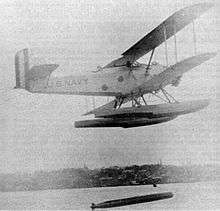Bliss-Leavitt Mark 7 torpedo
| Bliss-Leavitt Mark 7 torpedo | |
|---|---|
 Bliss-Leavitt Mark 7 torpedo outside the torpedo factory on Goat Island, Newport, Rhode Island, August 1913. | |
| Type | Anti-surface ship torpedo[1] |
| Place of origin |
|
| Service history | |
| In service | 1912–1945[1] |
| Used by |
|
| Wars | World War II |
| Production history | |
| Designer | Frank McDowell Leavitt |
| Designed | 1911[1] |
| Manufacturer | E. W. Bliss Company |
| Number built | 240[2] |
| Variants |
Short Mark 7 torpedo Mod A[2] Mod 2A Mod 5A |
| Specifications | |
| Weight | 1628 pounds[1] |
| Length | 204 inches[1] |
| Diameter | 17.7 inches (45 centimeters)[1] |
|
| |
| Effective firing range | 3500-6000 yards[1] |
| Warhead | Mk 7 Mod 5, TNT or Torpex |
| Warhead weight | 326 pounds[1] |
Detonation mechanism | Mk 3 Mod 1 contact exploder[1] |
|
| |
| Engine | Turbine[1] |
| Speed | 35 knots |
Guidance system | Gyroscope[1] |
Launch platform | Destroyers and submarines[1] |
The Bliss-Leavitt Mark 7 torpedo was a Bliss-Leavitt torpedo developed and produced by the E. W. Bliss Company and the Naval Torpedo Station in Newport, Rhode Island in 1911. The Mark 7 was a major step in the evolution of the modern torpedo.[1] This innovative design featured the use of steam, generated from water sprayed into the combustion pot along with the fuel. The resulting mixture dramatically boosted the efficiency of the torpedo, leading to markedly improved performance.[3] The Mark 7 torpedo was issued to the US Navy fleet in 1912 and remained in service through World War II. This torpedo was also experimented on as an aircraft-launched weapon in the early 1920s.[2]

Mark 7 being dropped by a DT-2 torpedo plane during trials in the mid-1920s
References
- ↑ Newpower, Anthony (2006). Iron Men And Tin Fish: The Race to Build a Better Torpedo During World War II. Greenwood Publishing Group. p. 19. ISBN 0-275-99032-X.
This article is issued from Wikipedia - version of the 10/31/2016. The text is available under the Creative Commons Attribution/Share Alike but additional terms may apply for the media files.